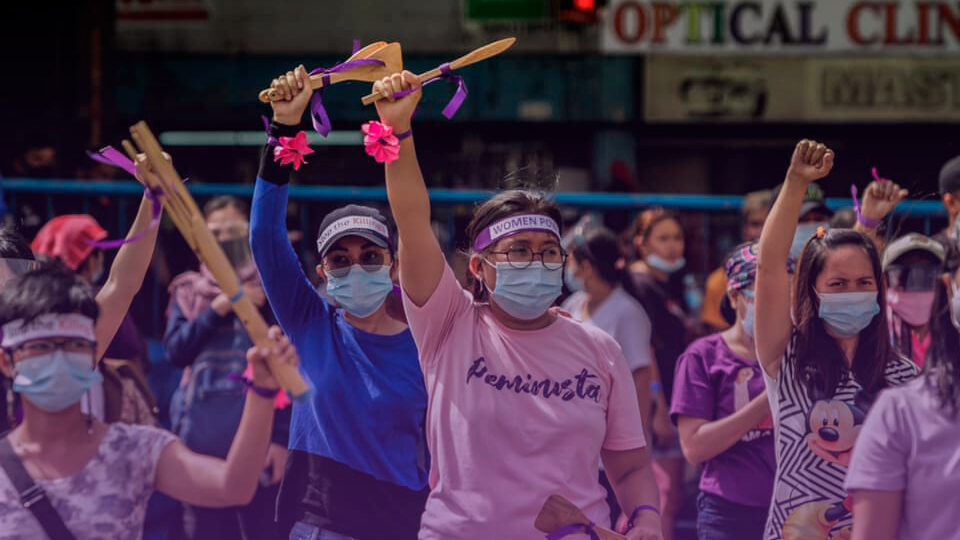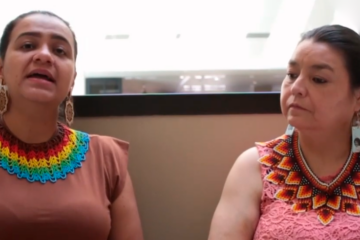Imperialism, sexual exploitation, and military bases. The fight against these violent processes of capitalist, patriarchal, and racist domination is connected to the longstanding and current struggles of women in the Philippines. To better understand how these stories continue to happen to this day, Capire interviewed Jean Enriquez, of the World March of Women coordinating board in the Philippines and the Coalition Against Trafficking in Women—Asia Pacific (CATW-AP).

In East and Southeast Asian countries, the exploitation of thousands of women as “comfort women” was one of the violent marks of the Japanese occupations and war. We’d like to start by getting your perspective on this story.
Women in countries like the Philippines, South Korea, Vietnam, China, and others around East Asia have been victims of military sexual slavery, particularly by the Japanese imperial forces and during the World War II. Girls and some boys aged nine to 16 were taken by the military. They were used, as they military would say, as “comfort women”. Those in the military had the thinking that women should be there to comfort them sexually. In the recent past, the same practice happened to US soldiers, that women should be there to entertain them sexually.
When I was a young feminist activist, I have interviewed some of these girls who were already grandmothers in the 1990s. There were lawyers from Japan who would want to take up the issue of the “Filipino comfort women”. When we were talking to them, it was hard for these older women to talk about their experiences because, especially during their time, the stigma against the victims was so strong. These are victims of sexual violence, rape, sexual slavery and, also, prostitution because sometimes the military would give money or do favors for some of them in exchange for the use of them sexually. In a sense, this is also one of the first sources of prostitution in the Philippines, although the first documentation is from the time of the Spanish occupation.
Up to the present time, these women have not received any form of compensation for the damages for being victims of sexual slavery. Not even in the form of an apology to admit it. This is considered to be a very sensitive issue for the Japanese government, and we have been organizing actions whenever the leader of the Philippines goes to Japan. We want this topic to be central in the agenda of the government. This is something that Japan has as a historical dept to our country and particularly to our women.
In South Korea there’s a very good documentation of the very brave grandmothers who are talking about this and how Japan has been avoiding this issue. I can imagine that is the same for women in China, Vietnam, and other countries.
How does this history of sexual slavery connect with the current reality of sexual exploitation and militarization in the region?
This relates to the current US military bases in the region. There are a huge concentration of women who were trafficked from different parts of the Philippines to supply the demand of American soldiers for sexual entertainment. We have so many records of abuse from the soldiers, and racist treatment of the Filipinas around the military bases. These stories are deeply racist and very violent. One case happened during the Ferdinand Marcos dictatorship, supported by the US, when a young girl who was being abused in prostitution died. A lot of these stories are violent, and it’s the same again in South Korea.
When we were trying to pass a law in the Philippines to punish the buyers of prostitution, within the Anti Trafficking Law, I went to South Korea because there are very strong sisters from the women groups around the military bases. I found that there were more than 1,000 Filipinas around the military bases in South Korea. They’re recruiting the women from the former US military bases location in the Philippines, in Angeles Pampanga, where the Clark Base is located.
This demonstrates how the assimilation in the culture of commodification of women, makes it easier for the capitalist sex industry to get women, and bring them to other countries.
That is basically globalizing prostitution, that is what trafficking is about. There’s a very strong connection among the pimps and traffickers here and the supplying to the demand of the US soldiers.
In the Philippines, prostituted women around the military basis are coming from rural areas. They have lost their land, there’s not enough source of income, so clearly it is exploiting also the poverty of the rural women, the daughters of farmers and fishers in the rural area. That’s their background. The soldiers really feel entitled to women whenever they come here. But it’s important to say that there is still a visiting forces agreement in the Philippines with the United States, even if we kicked out the US military basis from 1991 to 1992.
Could you tell us about the struggle to get US military bases out of the Philippines?
The voting was in 1991. We pushed the Philippines Senate to vote for the removal of the military bases, and then in 1992 eventually they left the Philippines. The American occupation started after the Spanish one, in 1898. So they started constructing the bases during the period of American colonization, from 1898 up to before the Japanese came. It was a long period of 90 years, and they have been installed slowly in different parts of the country.
Getting the US military bases out of the Philippines was historical because that was also the time when we have just removed the dictatorship.
After the Marcus dictatorship was removed in 1986, we kept on the battle to remove the US military bases. But the liberal government of Cory Aquino preferred the US as well. The years leading to the vote of the Senate were really critical. We marched again from Metro Manila to the military bases to have them removed. Finally, it was also important to have allies in the Senate to get the majority of votes to legally say that they were not needed in Philippines anymore.
The problem is that, with the following presidents as well, they continue to think that they need the US. We protested against these new agreements called Visiting Forces, which says that essentially there will be ships docking in more parts of the country. They chose those beautiful parts of the country for the soldiers to rest, and we know that when they say “rest”, they mean “women”.
We were able to push for a policy of zero tolerance of soldiers in picking women for prostitution. So, you won’t see them in the bars. But secretly, the pimps will bring them to the boats. We know it very well from the survivals in prostitution we organize, that some of the women are being brought inside the boats.
So, yes, It’s possible to kick out the military bases. However, it’s very tricky how, again, imperialism reinvents itself by just having an agreement that makes them not physically visible, but in fact they’re exercising power by getting access to our shores, and other very sacred environmental sanctuaries from our country. And, also, by influencing our policies, the World Trade Organization, and other such multilateral institutions where the US is also dominant.
Now Marcos’ son is the president, what does that mean?
It’s very emotional for us activists who have families who died because of the battle against the dictatorship. We have organized forums, a lot of online informational campaigns to tell the people how torture was so embedded in the system. There were older people among us talking about the torture that they experienced under the Marcos dictatorship. But the digital world has been so powerful that they were able to popularize that the young Marcos was different from the old one. They keep producing nonsensical videos on TikTok about the family of the young Marcos to show that he is accessible, very easy to talk to, anything that would humanize him. We could not compete with his digital media campaign. We also know that they spent a lot of money to connect with Cambridge Analytica. We lost this battle with him, and it feels really terrible.
I think that our WMW regional discussion in East and Southeast Asia and Oceania has pointed out the dangerous situation we are facing. In Indonesia and in other parts, the leaders always appear to be popular. They are not necessarily using force, but they are legitimizing the oppression by passing laws, specially economic laws that will allow their families greater access to land and enrich themselves in various ways. Marcos is the president, but he is also the Secretary of the Department of Agrarian Reform. It’s very clear that his family and his group of elite people have interest in agricultural lands and in the crops of our farmers. It’s a very direct economic interest.
We cannot only focus on the human rights violation, we really have to get the connection of them to the land grabbing and the implication of these policies on the farmers.
The farmers are already dying from the land grabbing. That is why the World March of Women in Philippines is focusing on rural women issues, because their voices in the provinces and rural areas are not heard in Metro Manila.




